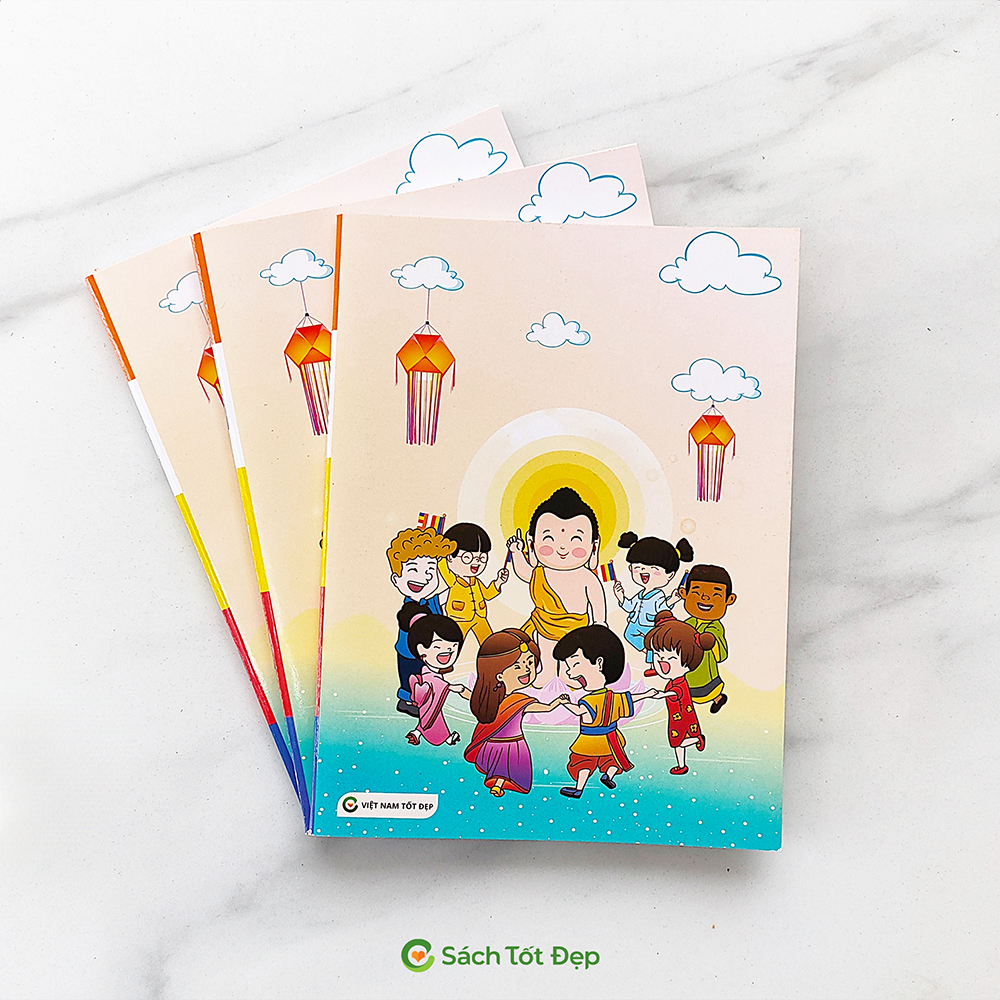The Positive Influence of Buddhism on Youth
In my twenties, reading Thich Nhat Hanh’s “”The Ideal Love of Youth”” and “”Talking to the Age of 20″” was deeply moving. Although I couldn’t fully grasp the messages conveyed by the Master at that immature time, I felt an awakening in my soul.
The door to enlightenment opened gradually, bit by bit, day by day. As a child, I often participated in the Young Buddhist Family activities every Sunday, learning under the guidance of older members. The seeds of Buddhism were sown early, but it was only after reading the Master’s books that I truly realized the profound significance of Buddhism for the youth.
Why is Buddhism necessary for the youth, and what do young people truly need from Buddhism? This question is complex, sometimes a whole doctrine. But in its simplest sense, from my personal experience of both failures and successes, the youth need Buddhism for three main reasons: Compassion, Wisdom, and Courage.
• The Spirit of Compassion:
Young people have many emotions and desires, the greatest of which is often attachment. They see love as the most wonderful thing in life. They easily love life, people, and nature. They are young and have time, so they indulge in their desires. Unaware of their real needs, they suffer from their losses and rejoice in their gains.
They cling to the feeling of ‘having’ and fear the feeling of ‘losing’. Thus, they strive to possess as much attachment as possible, both towards people and things. But eventually, a quiet voice from within shows them their unhappiness. The more they ‘attach’, the less happy they are. All the laughter and crowd are just a facade, but in solitude, they still feel lonely and empty. At this point, Buddhism can help them.
The seed of attachment consists of 50% desire and 50% affection. If the ‘affection’ is transformed more than 51%, young people tend to practice the mind of compassion. The lower the percentage of desire, the higher the pure affection, creating an opportunity for compassion to grow. Compassion, in its simplest form, means to love, empathize, and have a profound heart-felt connection with everything and everyone. The concept of impermanence in Buddhism helps the youth transform. When they deeply understand that nothing is permanent, their greed gradually fades.
• The Spirit of Wisdom:
A characteristic of the youth is curiosity and a thirst for knowledge. They want to know, learn, and accumulate knowledge. Knowledge is crucial, and the Buddha’s teachings highlight ignorance as the greatest flaw in human life. However, mere accumulation of knowledge doesn’t make one useful. Knowledge must be profound and beneficial for oneself and society.
Buddhism helps the youth distinguish between raw knowledge and wisdom through the concept of ignorance. Deep understanding of ignorance reveals that having much knowledge doesn’t equate to being wise. Holding onto what one knows, leading to actions that do not benefit others, is also ignorance.
Ignorance can be simply understood in two ways: one is the lack of insight into the true nature of life, and the other is not seeing things as they are. Young people, with their knowledge, combined with the practice of liberation from ignorance, will then possess bright wisdom to do things beneficial for themselves, discern right from wrong, and contribute usefully to the community.
• The Spirit of Courage:
Everyone has been young and knows that a prominent trait of youth is competitiveness. This competitive nature often leads young people to disregard all else, centering their large egos in every action. At that time, they might not even realize their competitiveness. They only know they must excel, succeed, and be acknowledged by others, often ignoring the risks, dangers, and injuries to themselves.
However, the positive aspect of competitive individuals is their willingness to think, act, and step forward. This is also a characteristic of the brave. So, how to transform competitiveness into courage? It involves letting go of ego. Buddhism, with its teaching of ‘anatta’ or no-self and various stories and methods, helps the youth shed their arrogance. When they understand that the ego cannot exist alone but is connected to all causes and conditions and people around them, the ego can exist. Thus, if they maintain the spirit of striving forward but can let go of ego, they will have the spirit of courage.
Youth, with their inherent beautiful love and ideals, if enlightened and supported by the spirits of compassion, wisdom, and courage, will become confident, strong, and useful.
Without compassion, a person with wisdom and courage might become arrogant, overbearing, and lack empathy for others. But only having compassion without wisdom and courage can make a person weak, lacking the means and will to do useful work.
And, having compassion and courage without wisdom means the youth lack the means to do good, unable to fully utilize their potential, and not knowing the right path to follow.
If they have wisdom and compassion but lack courage, they lack the fire and commitment, making all dreams and ambitions remain in theory and imagination.
Of course, learning, transforming, and practicing these three spirits is not an overnight process. There are many methods for the youth to choose from, such as reading books, meditating, listening to explanations from predecessors, and most importantly, practicing in daily life, in every small action, every moment. When they skillfully and flexibly combine compassion, wisdom, and courage, the youth are truly heading towards a diligent and peaceful life from within.
What do young people think?
– Phong Chanh (Designer, committed vegetarian)
Short-term and long-term meditation retreats currently attract many young people, which is the most apparent sign of the benefits Buddhism brings to youth. In this era, with exploding social media information, values, cultures, and trends are all mixed up.
People often carelessly express their opinions, treating Facebook statuses as knowledge, and blindly believing in the one-sided information from tabloids… leading to extreme thoughts, words, and actions that affect their work and lifestyle.
Those who early recognize this ‘suffering’ find Buddhism as a true mentor. Initially drawn by spirituality, but with the curiosity and eagerness of youth, they delve deeply into Buddhist philosophy, teachings, and practices like meditation that enhance physical and mental well-being. They apply these teachings in real life, achieving balanced emotions and a peaceful life.
Importantly, when a young person learns Buddhism, they contribute significant values to society.
– Nghiêm Hương Diệu (Works at a Buddhist Club in Hanoi)
The presence of Buddha and His teachings are not just for humanity, but for both old and young people, embodying Compassion and Wisdom. These two ‘medicines’ can conquer all troubles. This shows that young people have both Compassion and Wisdom to develop when turning to Buddhism. Therefore, they have the advantage of health and spirit to wisely receive the truth.
What do young people need from Buddhism? They need to learn how to live, how to be a person from Buddhism, maximizing the spirit from the two ‘medicines’ of Compassion and Wisdom as mentioned. They need understanding about Buddhism’s pervasive unity, which includes no discrimination, no criticism, and no mockery among different sects of this or that country, promoting non-violence.
Currently, I am working on Tibetan Buddhism, which involves sharing, connecting, and expanding my understanding of applying Tibetan Buddhist teachings in life. The Tibetan understanding of Buddhism is simple; it’s about the presence of kindness everywhere.
– Trịnh Ngọc Hân (Manages the Sala Foundation Buddhist YouTube channel)
A firm belief of mine is that doing good contributes to making life beautiful, bringing peace of mind, reducing stress, enjoying life, and becoming happier. I think this approach has led the youth to apply Buddhism more, moving beyond traditional rituals.
Young people often don’t go to temples primarily to pray. Many view visiting temples as an experience, similar to traveling. They sometimes approach Buddhism to gather experiences, seeking philosophies to overcome their current circumstances. This quest for knowledge and experience makes their perspective more scientific and multifaceted.
They see meditation not just as a spiritual practice but also as beneficial for health and intellect. They view vegetarianism not just as non-killing but also as a way to protect the environment and improve personal health. These aspects make them more connected to Buddhism.
Furthermore, what the youth need most from Buddhism is ‘connection’. My work with the Sala Foundation Buddhist YouTube channel contributes a small part to creating ‘connections’ for young people with Buddhism. Youth sometimes need flexibility, openness, and easier understanding from Buddhist philosophies.
Some of my friends simply focus on the heart, living with kindness, doing good for themselves, friends, family, and community, which is already following Buddhism.
From Giác Ngộ Newspaper
“
Sản phẩm bạn có thể quan tâm

Wisdom Combo: 5 books + 3 special gifts
Coloring book
280.000đ

Let’s play with Sen Sun: Buddha’s birthday
Coloring book
28.000đ

Tot Dep Notebook 96-pages
Warning: Undefined array key 0 in /home/totdepc/public_html/sach/wp-content/themes/totdepbookstore/single.php on line 357
Warning: Attempt to read property "name" on null in /home/totdepc/public_html/sach/wp-content/themes/totdepbookstore/single.php on line 357
8.000đ

Buddha’s Little Explorers: Where is Buddha?
Interactive book
59.000đ





